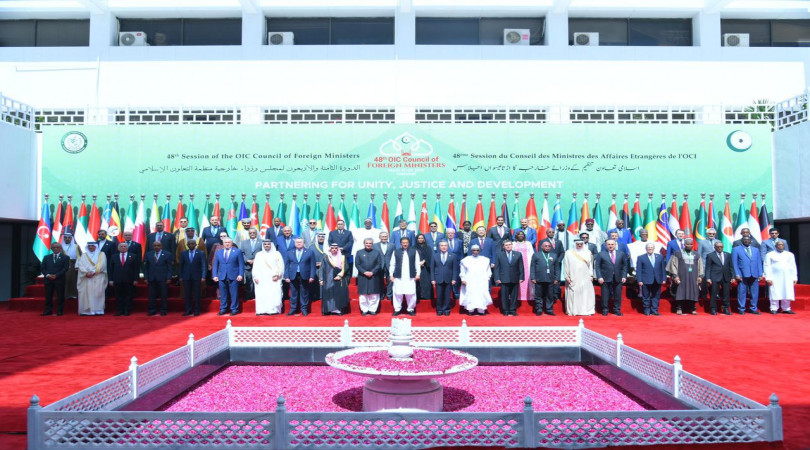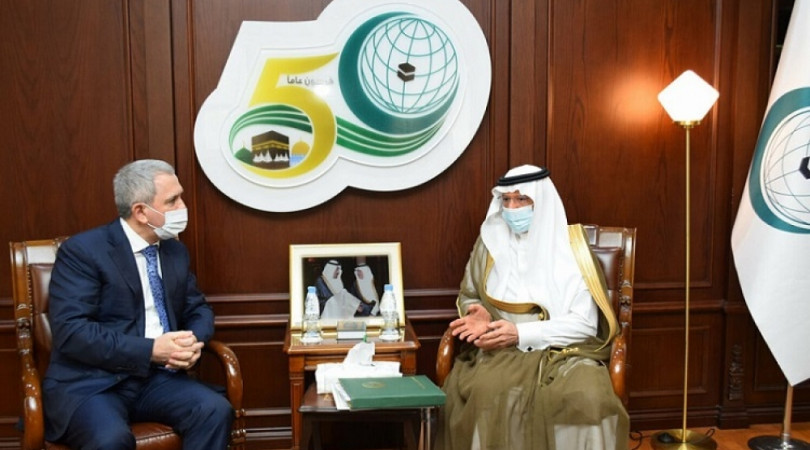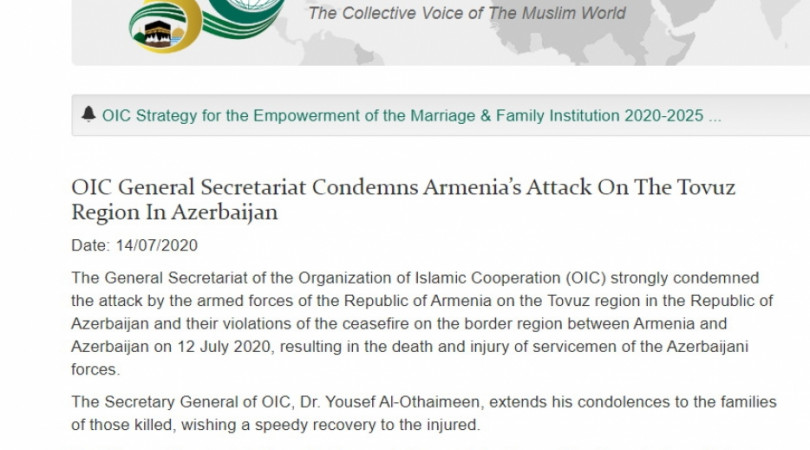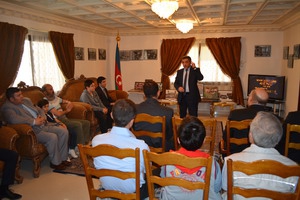Azerbaijan`s Embassy in Saudi Arabia has organized a commemorative event marking the 22nd anniversary of the Khojaly genocide
February 26, 2014. The event brought together officials of Saudi Arabia, employees of the diplomatic corps and journalists.
Azerbaijan`s Ambassador to Saudi Arabia Rasim Rzayev briefed the event participants about the Khojaly genocide.
Participants viewed photographs reflecting the tragedy.
CDs, books and materials on the Khojaly massacre were distributed to participants of the event.
Participants watched a documentary and video clip on the Khojaly tragedy featuring rapper Toni Blackman and Dayirman.
STATEMENT
of the Commissioner for Human Rights (Ombudsman) of the
Republic of Azerbaijan on the 22nd anniversary of the Khojaly
Genocide
At the night from 25th to 26th February of 1992, the crime committed in Khojaly city by Armenian armed forces together with the 366th moto-artillery regiment of the former Soviet army in Khankandi was one of the unprecedented events not only in the history of Nagorno-Karabakh conflict but also of the world warfare due to its horrible results. A lot of heavy military equipment of this regiment also consisting of Armenian officers entered the city; totally destroyed and burned down the houses and social infrastructure. The perpetrators annihilated people who were forced to leave the city in horror.
During the Khojaly genocide, 613 people whose names were known, including 106 women, 63 children and 70 old people were killed. 487 peaceful civilians were injured and became disabled, 1275 civilians were taken captive and hostages. The fate of 150 missing persons remains still unknown. During this massacre eight families were totally exterminated, 25 children lost of both, 130 children of one parent, civilians were killed with savagery, captives and hostages were subjected to merciless torture. Thus, fundamental human rights of our people, especially the fundamental right to life were grossly and severely violated.
This massacre, committed by Armenian invaders, who are not yet subjected to any sanction, is an act of genocide due to its unimaginable cruelty and inhuman punishment methods. Under the international law, genocide is defined as a crime against peace and mankind and is considered to be the gravest international crime. The UN General Assembly Resolution 96 (I) of 11 December 1946 states that genocide, violating the right of people to life, damages human dignity, and deprives the mankind of the material and spiritual values created by human beings. Such acts are completely contrary to the purpose and duties of the United Nations and to universal values.
The legal definition of the crime of genocide was determined in the United Nations Convention on the Prevention and Punishment of the Crime of Genocide adopted by the Resolution 260(III) of the UN General Assembly of 9 December 1948. The State Parties to this Convention confirmed that genocide, whether committed in time of peace or war, is a crime under international law which they undertake to prevent and punish.
Thus, commitment of criminal acts, planned in advance and aimed at mass annihilation of people on the ground of their national background during the Khojaly genocide, confirms that such acts constitute the crime of genocide under international and domestic laws. Such brutality and vandalism shall be recognized as a grave crime against humanity. During the Armenian aggression againstAzerbaijanall elements of the crime of genocide stated in the abovementioned Convention were applied.
The occupied territory of Nagorno-Karabakh and surrounding seven rayons are integral part of the Azerbaijani territory. This is evidenced by the UN Security Council Resolutions 822, 853, 874, 884 from 1993, UNGA Resolution titled "Situation on the occupied territories of Azerbaijan" dated on March 14, 2008, Resolution 1416 from 2005 and Recommendation 1669 from 2009 of the Parliamentary Assembly of the Council of Europe (PACE) confirming the occupation of Azerbaijani territories by the Armenian military forces, and governing of Nagorno-Karabakh by separatists prove the abovementioned facts once again.
The Resolution of the European Parliament on the Nagorno-Karabakh, dated 23 October 2013 proves the support by the international community the just position of our country and confirms the fact of occupation. For the first time, this document denotes the importance of settlement of the Nagorno-Karabakh conflict according to the UN Security Council resolutions and immediate, unconditional and total withdrawal of the Armenian armed forces from the occupied territories. Regretfully, no action was taken concerned, so, this conflict has not yet been settled due to unconstructive position ofArmeniathat does not fulfill the international resolutions.
The National Leader Heydar Aliyev unveiled the essence of the Khojaly massacre, and in February 1994 the Milli Majlis (Parliament) of the Republic of Azerbaijan gave legal and political assessment to this tragedy. President ofAzerbaijan, Ilham Aliyev underlined resolutely the necessity of this conflict resolution in the frame of integrity of Azerbaijani territories as well as emphases the necessity of withdrawal of occupant forces from the Azerbaijani territories.
"The Action Plan on 22nd Anniversary of the Khojaly Genocide" was approved, under which press conferences, commemorative ceremonies, issuing the materials on Khojaly massacre in foreign and local mass media, teleradio channels and on the internet pages, the first lessons in educational facilities devoted to the Khojaly massacre will be carried out.
West Virginia State's House of Representatives (USA) passed a resolution on the Khojaly tragedy. This Resolution commemorates that Khojaly tragedy is a part of the military aggression carried out by Armenian military troops in Nagorno Karabakh region ofAzerbaijansince 1988. Earlier, legislative bodies of other States of the US such as California, Massachusetts, Texas, New-Jersey, Maine, New Mexico, Arkansas, Georgia, Oklahoma, Tennessee, Pennsylvania, Connecticut, Florida and Mississippi had also passed the related resolutions and demanded subjecting of perpetrators of Khojaly massacre to the criminal responsibility.
Already, the Parliaments of Canada, Mexico, Columbia, Peru, the Republic of Pakistan, Bosnia and Herzegovina, Romania, the Czech Republic and Jordan also recognized the Khojaly genocide.
Embassies, diplomatic missions, diaspora organizations and communities of theRepublicofAzerbaijan, in different countries, hold multiply events devoted to Khojaly genocide.
The European Azerbaijan Society addressed a petition to the German Bundestag on commemoration of the Khojaly genocide and recognition over one million refugees and IDPs as a result of the occupation. The petition requests that "the German Bundestag expects the ongoing conflict to be resolved within the framework of the international law, also ensuring that relevant UN decisions, together with the decisions of PACE and OSCE, are fulfilled by all parties.
The aim of the "Justice for Khojaly" campaign organized by the Organization of the Islamic Conference (OIC) Youth Forum carried out in over 40 countries of the world is also to aware m the international community about this bloody event.
It makes indignant and regretful that it has not yet given legal assessment to this crime at the international level and effective measures against terror acts are not undertaken. The international organizations shall strengthen the efforts towards solution of this conflict and recognize this crime as an act of genocide, shall impose sanctions on perpetrators of this crime in compliance with the norms and principles of international law without double standards.
We do once again declare that Khojaly a tragedy is an act of genocide according to the international legal norms. Armenia shall fulfill international provisions of documents on this conflict, territorial integrity of Azerbaijan must be restored, the Azerbaijani captives and hostages shall be liberated, violated rights of refugees and IDPs shall be restored and they must be returned to their homes.
Elmira Suleymanova
Commissioner for Human Rights (Ombudsman)
of the Republic of Azerbaijan
12.02.2014
The Statement is addressed to the Secretary-General of the United Nations, United Nations Security Council, United Nations High Commissioner for Human Rights, European Commission, Council of Europe, Council of Europe, OSCE, International Ombudsman Institute, European Ombudsman Institute and Asian Ombudsman Association, International Peace Bureau, International Peace Federation, ombudspersons of foreign countries, embassies of the Republic of Azerbaijan abroad, as well as the foreign embassies in Azerbaijan and organizations of the Azerbaijani Diaspora.


















